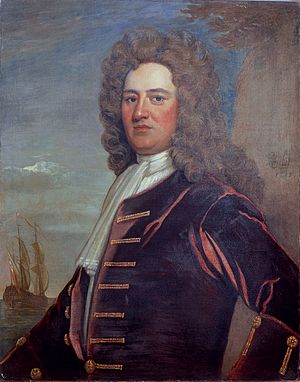Edward Hopson facts for kids
Quick facts for kids
Edward Hopson
|
|
|---|---|

Portrait of Edward Hopson by Godfrey Kneller,
painted in 1709 |
|
| Born | 1671 |
| Died | 8 May 1728 |
| Allegiance | |
| Service/ |
|
| Rank | Vice admiral |
| Commands held | Thunderbolt Mary (1650) Mary (1704) Burford Jamaica Station |
| Battles/wars | War of the Spanish Succession Anglo-Spanish War |
Edward Hopson (1671 – 8 May 1728) was a high-ranking officer in the Royal Navy. He became a Vice Admiral and was in charge of the Jamaica Station, a key naval base in the Caribbean.
Contents
Edward Hopson was born in 1671. His father was a gunner at Sandham Fort on the Isle of Wight. Edward's uncle, Sir Thomas Hopsonn, was also a vice admiral. Edward decided to follow his uncle into the Royal Navy.
By 1693, Edward was serving as a first lieutenant on the ship Breda. This was an important step in his naval career.
In 1696, at the age of 25, he received his first command. He became a post captain of the Thunderbolt. This was a smaller warship, known as a fifth-rate ship. For two years, he sailed the Irish Sea on patrols.
In 1702, Captain Hopson took command of a larger ship, the Mary. This was a third-rate ship, meaning it was a more powerful warship. He took part in the Battle of Vigo Bay in October of that year. This was a major naval battle during the War of the Spanish Succession.
The following year, his ship, the Mary, became the flagship for Rear Admiral Basil Beaumont. A flagship is the main ship where an admiral directs his fleet. They were blocking the port of Dunkirk.
On 27 November 1703, a terrible storm, known as the Great Storm of 1703, hit. Luckily for Hopson, he was on land. His ship, the Mary, was pushed onto the Goodwin Sands and sank. Everyone on board was lost.
After this, Captain Hopson spent most of the rest of the War of the Spanish Succession in the Mediterranean Sea. He commanded a new ship, also named Mary. By 1715, he was commanding the Burford. This ship was part of a fleet that sailed to the Baltic Sea under Sir John Norris.
Serving as an Admiral
On 8 May 1719, Edward Hopson was promoted to Rear Admiral of the Blue. He raised his flag on the Dorsetshire. As an admiral, he joined Sir John Norris on three more trips to the Baltic Sea in 1719, 1720, and 1721.
He was promoted again on 16 February 1722, becoming Rear Admiral of the Red. However, he did not have an active command until 1726.
Protecting Gibraltar
In 1726, Admiral Hopson led a small squadron of ships to Gibraltar. A squadron is a group of warships. He joined another squadron led by Sir John Jennings. Their mission was to stop Spain from attacking Gibraltar.
When Sir John Jennings sailed home, Hopson took over command in the Mediterranean. On 19 April 1727, he was promoted to Vice Admiral of the Blue. Relations with Spain worsened, leading to the Anglo-Spanish War. Six more ships arrived under Sir Charles Wager, who took overall command. Hopson served under him during the Thirteenth Siege of Gibraltar.
Final Mission in the West Indies
In December 1727, Vice Admiral Hopson was ordered to take command in the West Indies. The previous admiral, Sir Francis Hosier, had died there. Hopson left Gibraltar on the Lion on 17 December.
He arrived in the West Indies on 29 January 1728. He became the Commander-in-Chief of the Jamaica Station. During his journey across the Atlantic Ocean, he was promoted again to Vice Admiral of the White.
Upon arrival, he moved his flag to the Leopard. He continued the Blockade of Porto Bello that his predecessor had started. However, like many others in the fleet, he became sick with tropical diseases. Edward Hopson died on 8 May 1728.
His will, a legal document about his wishes, mentioned his wife Jane and his son Edward, who was still young. It also mentioned his mother and a widowed sister, Jane.
 | Madam C. J. Walker |
 | Janet Emerson Bashen |
 | Annie Turnbo Malone |
 | Maggie L. Walker |

